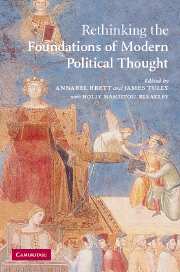Book contents
- Frontmatter
- Contents
- List of contributors
- Preface
- Part I Introduction
- Part II Rethinking the foundations
- 3 Foundations and moments
- 4 Skinner, pre-humanist rhetorical culture and Machiavelli
- 5 Unoriginal authors: how to do things with texts in the Renaissance
- 6 ‘The Best State of the Commonwealth’: Thomas More and Quentin Skinner
- 7 Scholasticism in Quentin Skinner's Foundations
- 8 Scholastic political thought and the modern concept of the state
- 9 ‘So meerly humane’: theories of resistance in early-modern Europe
- 10 Hobbes and democracy
- 11 A lion in the house: Hobbes and democracy
- 12 Hobbes and the foundations of modern international thought
- 13 Surveying The Foundations: a retrospect and reassessment
- Bibliography
- Index
13 - Surveying The Foundations: a retrospect and reassessment
Published online by Cambridge University Press: 19 February 2010
- Frontmatter
- Contents
- List of contributors
- Preface
- Part I Introduction
- Part II Rethinking the foundations
- 3 Foundations and moments
- 4 Skinner, pre-humanist rhetorical culture and Machiavelli
- 5 Unoriginal authors: how to do things with texts in the Renaissance
- 6 ‘The Best State of the Commonwealth’: Thomas More and Quentin Skinner
- 7 Scholasticism in Quentin Skinner's Foundations
- 8 Scholastic political thought and the modern concept of the state
- 9 ‘So meerly humane’: theories of resistance in early-modern Europe
- 10 Hobbes and democracy
- 11 A lion in the house: Hobbes and democracy
- 12 Hobbes and the foundations of modern international thought
- 13 Surveying The Foundations: a retrospect and reassessment
- Bibliography
- Index
Summary
David Hume observes at the beginning of his autobiography that ‘it is difficult for a man to speak long of himself without Vanity: Therefore I shall be short’. I would go further and say that, in writing the kind of autobiographical essay on which I am embarking here, it is impossible to avoid some element of self-praise. Moreover, I cannot agree with Hume that the best means of coping with the problem is simply to speak as briefly as possible. The foregoing chapters about my work are of such an exceptionally high level of interest and originality that they demand to be examined at length. The only solution, as far as I can see, is to apologise at the outset for any crassness of tone and press on with the task in hand.
I am deeply indebted to Annabel Brett, James Tully and Holly Hamilton-Bleakley for editing this volume, and for giving me an opportunity to reflect anew on my intentions in writing The Foundations of Modern Political Thought. Re-reading the book, however, what chiefly strikes me is how far it falls short of the aspirations I originally had for it. My initial ambition – as I recorded in the acknowledgements – was to produce an historical survey encompassing the entire period from the Renaissance to the Enlightenment. While this was still a gleam in my eye, I delivered a course of lectures in Cambridge (as Mark Goldie recalls) under the title ‘The Making of Modern Political Thought’ in which, among other things, I vainly strove to understand the ideological origins of the French Revolution.
- Type
- Chapter
- Information
- Rethinking The Foundations of Modern Political Thought , pp. 236 - 261Publisher: Cambridge University PressPrint publication year: 2006
- 5
- Cited by



